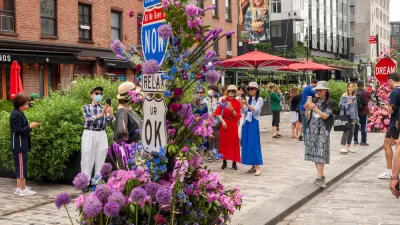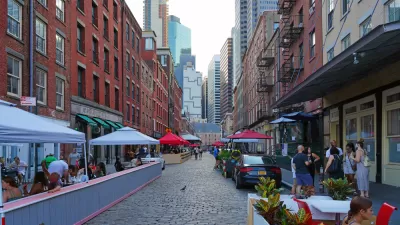In December 2019, the Downtown Brooklyn Public Realm Vision set ambitious goals for removing cars from one of New York's central business districts. Then came the pandemic and new tests for those ambitions.
Stakeholders in Downtown Brooklyn are building on a 2019 master plan that ranks as one of the most ambitious visions for car-free urbanism in the country.
The Downtown Brooklyn Partnership unveiled the Downtown Brooklyn Public Realm Vision in 2019, inspired in part by recent street redesigns in the city, like the pedestrianization of Times Square and the 14th Street Busway (Benjamin Schneider broke the news of the Public Realm Vision in December 2019).
A new article by John Schneider updates the progress toward achieving the master plan's ambitious vision—which includes a neighborhood network of Dutch-style shared streets, busways, protected bike lanes, and improvements to green spaces.
"It was a pedestrian-centric rebuke of the Robert Moses-era planning that dominates much of the borough, where cars flood wide streets en route to the Brooklyn and Manhattan Bridges," according to Surico.
With the pandemic generating unanticipated support for car-free reforms, the Downtown Brooklyn Partnership is hoping to build on that momentum by releasing the Downtown Brooklyn Public Realm Action Plan, a Covid-era update to the original master plan released earlier this month.
"The plan doubles down on the 2019 vision’s calls for pedestrianization, while picking up institutional support and a handful of tangible achievements since then. Not to mention a new streetscape paradigm: This is a city where pandemic-era curbside dining and 'Open Streets' are now permanent fixtures," writes Surico.
As detailed in the source article, linked below, the Downtown Brooklyn is far from alone in its efforts to pedestrianize New York City.
FULL STORY: Downtown Brooklyn’s Greener, Car-Free Future Is Taking Root

Alabama: Trump Terminates Settlements for Black Communities Harmed By Raw Sewage
Trump deemed the landmark civil rights agreement “illegal DEI and environmental justice policy.”

Study: Maui’s Plan to Convert Vacation Rentals to Long-Term Housing Could Cause Nearly $1 Billion Economic Loss
The plan would reduce visitor accommodation by 25% resulting in 1,900 jobs lost.

Planetizen Federal Action Tracker
A weekly monitor of how Trump’s orders and actions are impacting planners and planning in America.

Wind Energy on the Rise Despite Federal Policy Reversal
The Trump administration is revoking federal support for renewable energy, but demand for new projects continues unabated.

Passengers Flock to Caltrain After Electrification
The new electric trains are running faster and more reliably, leading to strong ridership growth on the Bay Area rail system.

Texas Churches Rally Behind ‘Yes in God’s Back Yard’ Legislation
Religious leaders want the state to reduce zoning regulations to streamline leasing church-owned land to housing developers.
Urban Design for Planners 1: Software Tools
This six-course series explores essential urban design concepts using open source software and equips planners with the tools they need to participate fully in the urban design process.
Planning for Universal Design
Learn the tools for implementing Universal Design in planning regulations.
Caltrans
Smith Gee Studio
Institute for Housing and Urban Development Studies (IHS)
City of Grandview
Harvard GSD Executive Education
Toledo-Lucas County Plan Commissions
Salt Lake City
NYU Wagner Graduate School of Public Service




























